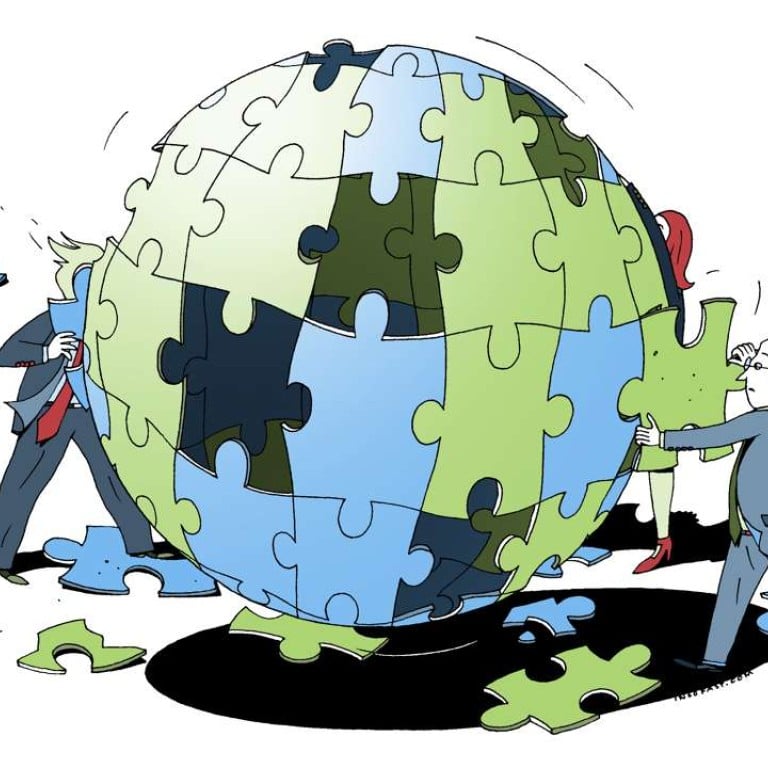
Trump’s disruptive effect, and a turning point for the US and beyond
Joseph E. Stiglitz says Trump’s arrival signals a historic moment, as both major US parties seek to reinvent themselves and the world braces for new uncertainties
On January 20, Donald Trump will be inaugurated as the 45th President of the United States. I hate to say “I told you so”, but his election should not have come as a surprise. As I explained in my 2002 book, Globalisation and its Discontents, the policies we have used to manage globalisation have sown the seeds of disaffection. Ironically, a candidate from the party that pushed the hardest for international financial and trade integration has won by promising to undo both.
But there is no going back. China and India are now integrated into the global economy, and new technology is cutting manufacturing jobs worldwide. Trump cannot recreate the well-paying manufacturing jobs of past decades; he can only push for advanced manufacturing, which requires higher skill sets and employs fewer people. Rising inequality, meanwhile, will continue to contribute to widespread despair, especially among the white voters in Middle America who handed Trump his victory.
Watch: Hillary Clinton calls on Americans to look to the future after losing election
Trump is clearly not a member of the traditional elite, which lent credence to his promise of ‘real’ change
In the first three years of the so-called recovery after the 2008 financial crisis, 91 per cent of the gains went to the top 1 per cent of earners. Wall Street banks were bailed out with billions of dollars in taxpayer money. US President Barack Obama’s economic policy team of Wall Street insiders broke the rules of capitalism to save the elite, confirming the suspicion of millions of Americans that the system is, as Trump would say, “rigged”.
Obama brought “change you can believe in” on issues such as climate policy; but with respect to the economy, he bolstered the status quo – the 30-year experiment with neo-liberalism, which promised that the benefits of globalisation would “trickle down” to everyone. Instead, the benefits trickled up.
Rising inequality, an unfair political system, and a government that spoke as if it was working for the people while acting for the elites created ideal conditions for a candidate like Trump to exploit. Though wealthy, Trump is clearly not a member of the traditional elite, which lent credence to his promise of“real”change. And yet it will be business as usual, as Trump will adhere to Republican orthodoxy on taxation and, by appointing lobbyists and industry insiders to his administration, has already broken his promise to “drain the swamp” in Washington.
Watch: Trump reportedly done with ‘drain the swamp’ policy
The rest of Trump’s economic agenda will depend largely on whether House Speaker Paul Ryan is a true fiscal conservative. Trump has proposed that large tax cuts for the rich be combined with massive infrastructure spending programmes, which would boost gross domestic product and improve the government’s fiscal position somewhat. If Ryan is not as concerned about the deficit as he says he is, he will rubber-stamp Trump’s agenda, and the economy will receive the Keynesian fiscal stimulus that it has long needed.
Another uncertainty relates to monetary policy. Trump has already spoken out against low interest rates. Add to that the large numbers of Federal Reserve officials itching to normalise rates, and it is a fair bet that they will do so – perhaps more than offsetting Trump’s Keynesian stimulus.

How a Trump trade war with China could do the US more harm than good
Now that Republicans control the White House and both houses of Congress, they will be relatively free to weaken workers’ bargaining power, deregulate Wall Street and other industries, and turn a blind eye to existing antitrust laws.
Watch: Trump promises to quit Pacific trade deal
Similarly, the international rule of law, enforced primarily through economic sanctions, could fare poorly under Trump. How will he respond if Russian-aligned troops escalate the conflict in Ukraine?
The Democrats will have a future only if they reject neo-liberalism, and adopt progressive policies
America’s real power has always derived from its standing as an inclusive democracy. But people around the world have now lost confidence in democratic processes. Indeed, throughout Africa, I have heard remarks such as, “Trump makes our dictators look good”. As American soft power continues to erode in 2017 and beyond, the future of the international order will become more uncertain.
Meanwhile, the Democratic Party will surely be conducting an election postmortem. Hillary Clinton undeniably lost because she failed to offer voters a convincing vision that was markedly different from the neo-liberal agenda of Bill Clinton in the 1990s. With its strategy of “triangulation”– adopting versions of its opponents’ policies – for more than a generation, the party of the left could no longer present itself as a credible alternative to the party of the right.
The Democrats will have a future only if they reject neo-liberalism, and adopt the progressive policies proposed by leaders such as Elizabeth Warren, Bernie Sanders and Sherrod Brown. This will put them in a strong position against the Republicans. With the arrival of Trump, and with both major parties now redefining themselves, the coming year may well be remembered as a turning point in US and world history.
Joseph E. Stiglitz, a Nobel laureate in economics, is University Professor at Columbia University and chief economist at the Roosevelt Institute. Copyright: Project Syndicate

